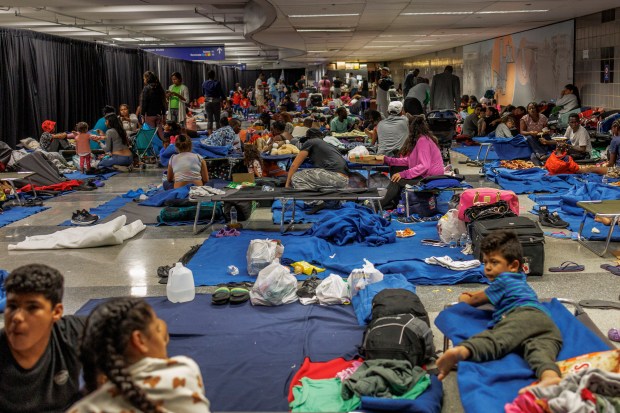O’Hare International Airport no longer has migrant encampments for the first time since families began sleeping there last summer, Mayor Brandon Johnson’s administration said Thursday as uncertainty remains over how he will handle the ongoing crisis when city funds for asylum seekers are expected to run out in a couple months.
The airport — for months home to hundreds of migrants who have camped out there while awaiting beds in the city-run shelter system — currently only has four migrants waiting there as of this morning, according to city data. The tentative relief comes after Chicago police stations, which at one point saw more than 3,300 asylum seekers sleeping on floors, were also cleared of encampments in December.
Johnson’s deputy chief-of-staff Cristina Pacione-Zayas noted to reporters the progress coincided with accelerated efforts to resettle migrants in permanent housing or in other cities. But she acknowledged hard choices lie ahead for the city as the $150 million Johnson budgeted for the migrant response this year is slated to be spent by April.
“Every day we’re in meetings, on calls with the state, with the county, to figure out what the long-term plan is to get through the calendar year together,” Pacione-Zayas said.
She did not say whether closing shelters or making budget cuts midyear was on the table.
Currently, there are 5,673 shelter residents required to exit the system by mid-March under Johnson’s 60-day limit policy, which has been pushed back multiple times amid inclement weather. Officials added that just as many residents have left the shelters after securing housing elsewhere and again deflected when asked what enforcement would look like.
“The first thing to know is that it’s not an eviction,” Department of Family and Support Services Commissioner Brandie Knazze said. “These are 60-day notices, where we’re really helping people connect and … having meetings with their case managers to talk about what their options are, what resources are available 21 days before the exit date.”
Pacione-Zayas added the city is still in the process of scaling back its reliance on Favorite Healthcare Staffing, its costliest vendor by far. Finding cheaper local options to replace the Kansas-based firm that staffs the shelters has proven an uphill climb in part because the city sent out a request-for-proposals last fall for the 15 sites open at that time. Now there are 28.
On top of that, only 11 of the 15 locations got bids, and some respondents didn’t meet the city’s requirements, Pacione-Zayas said. But she said the city is “in discussions about cycling in these partners” that are viable.
Last week, the mayor said costs of shelter staffing from contractors like Favorite Staffing have contributed to daily migrant response costs of $1.5 million each day. But in late January, the Johnson administration also upped its latest contract by $30 million, on top of $97 million already funneled to the vendor.
City officials also announced a new volunteer coordination program to handle migrants overflowing from city-run shelters, marking a new openness to work with volunteer groups.
Their “New Neighbors campaign volunteer program” will “streamline and coordinate volunteer efforts across the city between community members, mutual aid groups, aldermanic offices, city agencies and partner organizations,” Johnson’s deputy immigration mayor Rey Wences Najera said.
For months, volunteers have clashed with city officials over their inability to get inside shelters and work with city-contracted staff. In June, contracted security officials went so far as to call police on volunteers handing out food to migrants at a YMCA in West Ridge.
Pacione-Zayas added after the briefing that the program doesn’t mean more volunteers will be allowed in shelters right away to help. The goal of the program is two-fold: To augment care in city shelters with arts and crafts and other programming, and to create a working group to brainstorm additional roles for volunteers.
The program is a collaboration between the Chicago Refugee Coalition and Chicago Cares Inc.
“(This is) a sustained coordination of support and resources,” the deputy chief of staff said. “And ultimately, this system is meant to expand beyond this particular mission.”
The Tribune’s Olivia Olander contributed reporting.




